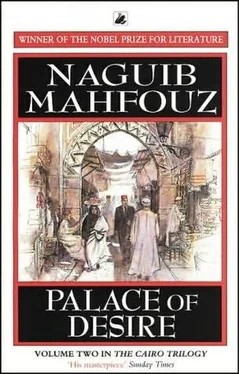Naguib Mahfouz - Palace of Desire
Здесь есть возможность читать онлайн «Naguib Mahfouz - Palace of Desire» весь текст электронной книги совершенно бесплатно (целиком полную версию без сокращений). В некоторых случаях можно слушать аудио, скачать через торрент в формате fb2 и присутствует краткое содержание. Жанр: Современная проза, на английском языке. Описание произведения, (предисловие) а так же отзывы посетителей доступны на портале библиотеки ЛибКат.
- Название:Palace of Desire
- Автор:
- Жанр:
- Год:неизвестен
- ISBN:нет данных
- Рейтинг книги:5 / 5. Голосов: 1
-
Избранное:Добавить в избранное
- Отзывы:
-
Ваша оценка:
- 100
- 1
- 2
- 3
- 4
- 5
Palace of Desire: краткое содержание, описание и аннотация
Предлагаем к чтению аннотацию, описание, краткое содержание или предисловие (зависит от того, что написал сам автор книги «Palace of Desire»). Если вы не нашли необходимую информацию о книге — напишите в комментариях, мы постараемся отыскать её.
, his rebellious children struggle to move beyond his domination, as the world around them opens to the currents of modernity and political and domestic turmoil brought by the 1920s.
Palace of Desire — читать онлайн бесплатно полную книгу (весь текст) целиком
Ниже представлен текст книги, разбитый по страницам. Система сохранения места последней прочитанной страницы, позволяет с удобством читать онлайн бесплатно книгу «Palace of Desire», без необходимости каждый раз заново искать на чём Вы остановились. Поставьте закладку, и сможете в любой момент перейти на страницу, на которой закончили чтение.
Интервал:
Закладка:
Husayn said, "It's time for us to turn back, don't you think? If we keep on this way, it will be so far that anyone who isn't hungry yet will be starved by the end."
When they reached the automobile, Husayn got out the bag and the basket with the food. He placed them on the hood of the car and started to open the lid of his basket, but A'ida suggested that they should eat on one of the blocks of the pyramid. They went there and climbed up on one of the bottom stones. Putting the fDod in the center of the block, they sat at the edge with their feet hanging over. Kamal spread out a newspaper that was in his bag and placed on it what he had brought two chickens, potatoes, cheese, bananas, and oranges. Then he watched Husayn's hands remove the angelic picnic from their basket: elegant sandwiches, four glasses, and a thermos. Although the food Kamal had brought was more substantial, it appeared — to him at least to lack the elegant flourish of theirs. He was beset by apprehension and embarrassment. Husayn gazed appreciatively at the chickens and asked if Kamal had brought any silverware. Kamal extracted knives and forks from the bag and began to slice up the chickens. Then A'ida removed the stopper from the thermos and started filling the glasses with a golden liquid.
Kamal was so surprised that he could not keep from asking, "What's that?"
A'ida laughed but did not reply. Winking at his sister, Husayn said quickly, "Beer."
"Beer!" Kamal exclaimed fearfully.
Pointing to the sandwiches, Husayn said defiantly, "And ham."
"You're making fun of me! I don't believe this."
"No, believe and eat. What a skeptic you are! We've brought the best food and the most delicious drink."
Kamal's eyes proclaimed his astonishment and alarm. He was tongue-tied, for he did not know what to say. What troubled him most was the fact that this food and drink had been obtained from their home and thus with the knowledge and consent of their parents.
"Haven't you ever had these before?"
"That's a question needing no reply."
"Then you'll taste them for the first time, and the credit is ours."
"Impossible."
"Why?"
"Why!.. Another question needing no reply."
Husayn, A'ida, and Budur raised their glasses and drank some beer. The first two smiled at Kamal as though to say, "You see. It didn't do anything to us."
Then Husayn said, "Religion, huh? A glass of beer doesn't make you drunk, and ham is delicious and good for you. I don't see the wisdom of letting religion intrude on questions of diet."
Kamal's heart felt bruised by these words, but in a tone as amiable as ever he said critically, "Husayn, don't blaspheme."
For the first time since they started eating A'ida spoke: "Don't think ill of us. We only drink beer to whet our appetites. Perhaps Budur's participation will satisfy you of our good intentions. And ham's very tasty. Try it. Don't be a Hanbali fundamentalist. There are enormous opportunities for you to obey religion in more important ways than this."
Although her words did not differ in any essential way from Husayn's, they brought peace and balm to his wounded heart. Her words also found in him a soul totally committed to doing nothing to upset them or hurt their feelings. He smiled with gentle forbearance and, picking up some of his own food, said, "Let me eat the food I'm accustomed to and do me the honor of sharing it."
Husayn laughed. Gesturing toward his sister, he told Kamal, "We agreed at home to boycott your food if you boycotted ours, but it see ms we did not properly appreciate your situation. Therefore, in your honor, I'm going to withdraw from that agreement. Perhaps Ai'da will follow my example."
Kamal looked hopefully in her direction, and she said with a smile, "If you promise not to think ill of us."
Kamal answered delightedly, "Death to anyone who thinks ill of you."
They ate with great appetite, Husayn and Ai'da first. Then Kamal, encouraged by watching them, followed suit. He served Budur her food himself. She was content with one sandwich and a piece of chicken breast. Then she turned her attention to the fruit. Kamal could not resist the temptation to observe Husayn and Aida surreptitiously as they ate, in order to see how they handled their food. Oblivious to his surroundings, Husayn devoured his food as though he were alone. Even so, he did not lose his distinguished air and thus represented in Kamal's eyes the beloved aristocracy acting spontaneously. Ai'da revealed new dimensions of elegance, grace, and refinement whether in cutting the meat, in grasping the sandwiches by the tips of her fingers, or in the movements of her lips as she chewed. All this took place in an easy, relaxed manner, without any affectation or embarrassment. The truth was that Kamal bad been looking forward to this moment expectantly and inci edulously, as though skeptical that she ate food like other human beings. Although his knowledge of the type of food she was consuming troubled his religious sensibilities greatly, he found in its novel and unusual nature, compared with what people he knew ate, a parallel to the eater herself, and thishelped calm his questioning, perplexed imagination. Two contradictory feelings alternated within him. At first he was uneasy to see her undertake this activity in which both men and animals share. Then he felt somewhat relieved, since this activity brought the two of them closer together, if only a little. But he was still not free of questions. He was forced to wonder whether she also participated in other natural human functions. He could not deny that, but it was hard for him to accept. Therefore he refused to answer, although he experienced a sensation he had not known previously, one containing a silent protest against the laws of nature.
"I admire your feeling for religion and your moral idealism."
Kamal looked at his friend cautiously and suspiciously. So Husayn affirmed, "I'm speaking sincerely, not making a joke."
Kamal smiled shyly. Then he pointed at the remaining sandwiches and beer as he said, "Despite all this, your celebrations in the month of Ramadan are beyond description. Lights are lit, the Qur'an is recited in the reception hall, the call to prayer rings out in the gentlemen's parlor. Isn't that so?"
"My father celebrates the nights of Ramadan out of love, respect, and veneration for the traditions my grandfather observed. He and Mama are also scrupulous about fasting."
Ai'da said with a smile, "I am too."
With an earnestnesshe meant to be sarcastic Husayn said, "Ai'da fasts one day out of the whole month and sometimes gives up by afternoon."
A'ida retorted in revenge, "Instead of fasting, Husayn eats four meals a day during Ramadan: the three normal ones and then the meal before daybreak reserved for fasters."
Husayn laughed, and food would have fallen from his mouth if he had not reared his head back quickly. He said, "Isn't it strange that we know so little of our religion? What Papa and Mama know about it is hardly worth mentioning. Our nurse was Greek. A'ida knows more about Christianity and its rituals than she does about Islam. Compared with you we can be considered pagans". Then, addressing A'ida, he added, "Kamal reads the Qur'an and works about the life of the Prophet."
In a tone giving a hint of admiration she said, "Really? Bravo! But don't think any worse of me than is absolutely necessary, for I've memorized more than one Qur'an sura."
Kamal murmured dreamily, "Marvelous, extremely marvelous. Which one, for example?"
She stopped eating to try to remember. Then with a smile she replied, "I mean I used to know some chapters by heart. I'm not sure how much I've retained…". Then, raising her voice as though she had found what she was searching for, she continued: "Like the sura which speaks of God's unity and so forth."
Читать дальшеИнтервал:
Закладка:
Похожие книги на «Palace of Desire»
Представляем Вашему вниманию похожие книги на «Palace of Desire» списком для выбора. Мы отобрали схожую по названию и смыслу литературу в надежде предоставить читателям больше вариантов отыскать новые, интересные, ещё непрочитанные произведения.
Обсуждение, отзывы о книге «Palace of Desire» и просто собственные мнения читателей. Оставьте ваши комментарии, напишите, что Вы думаете о произведении, его смысле или главных героях. Укажите что конкретно понравилось, а что нет, и почему Вы так считаете.












